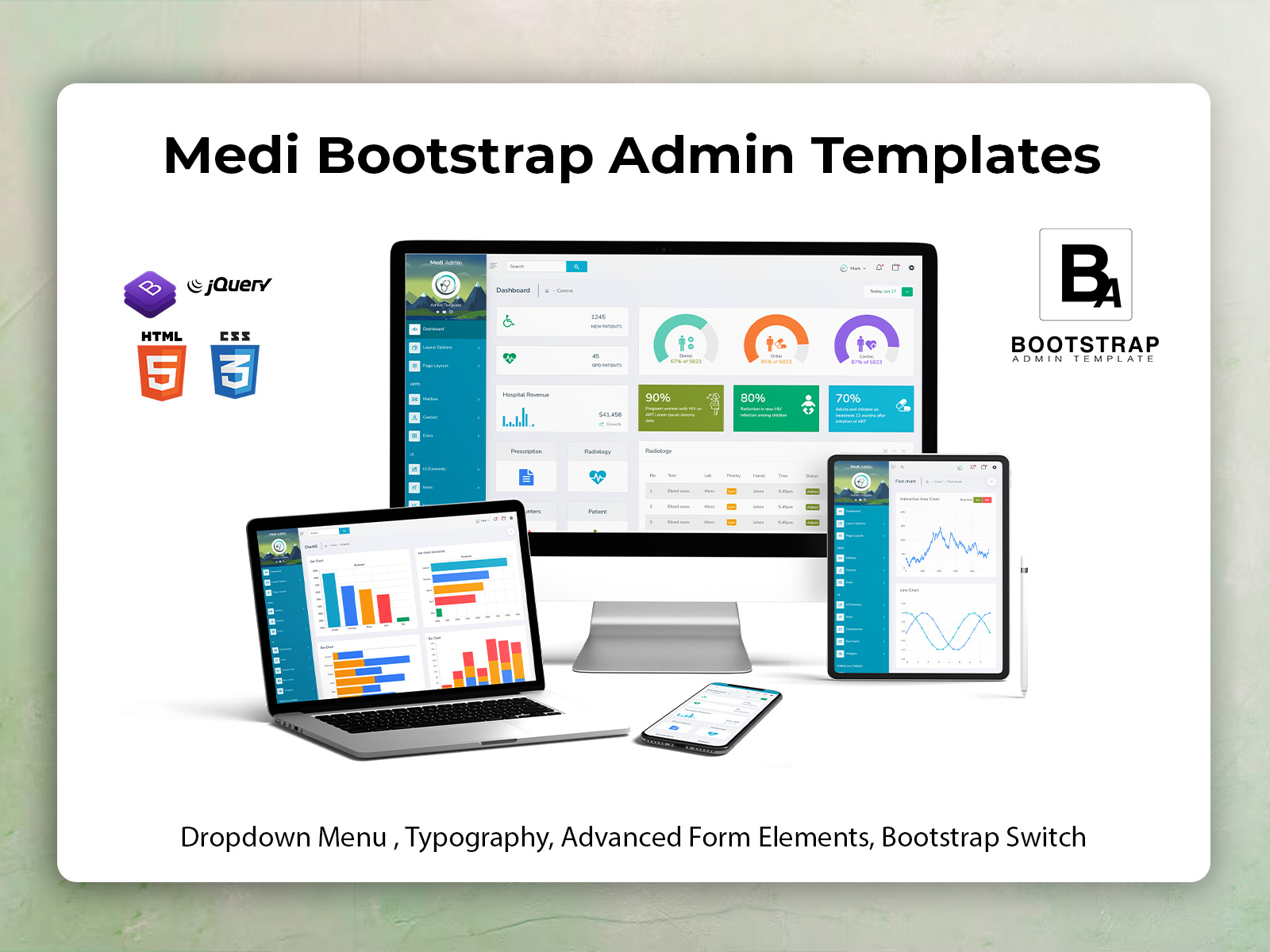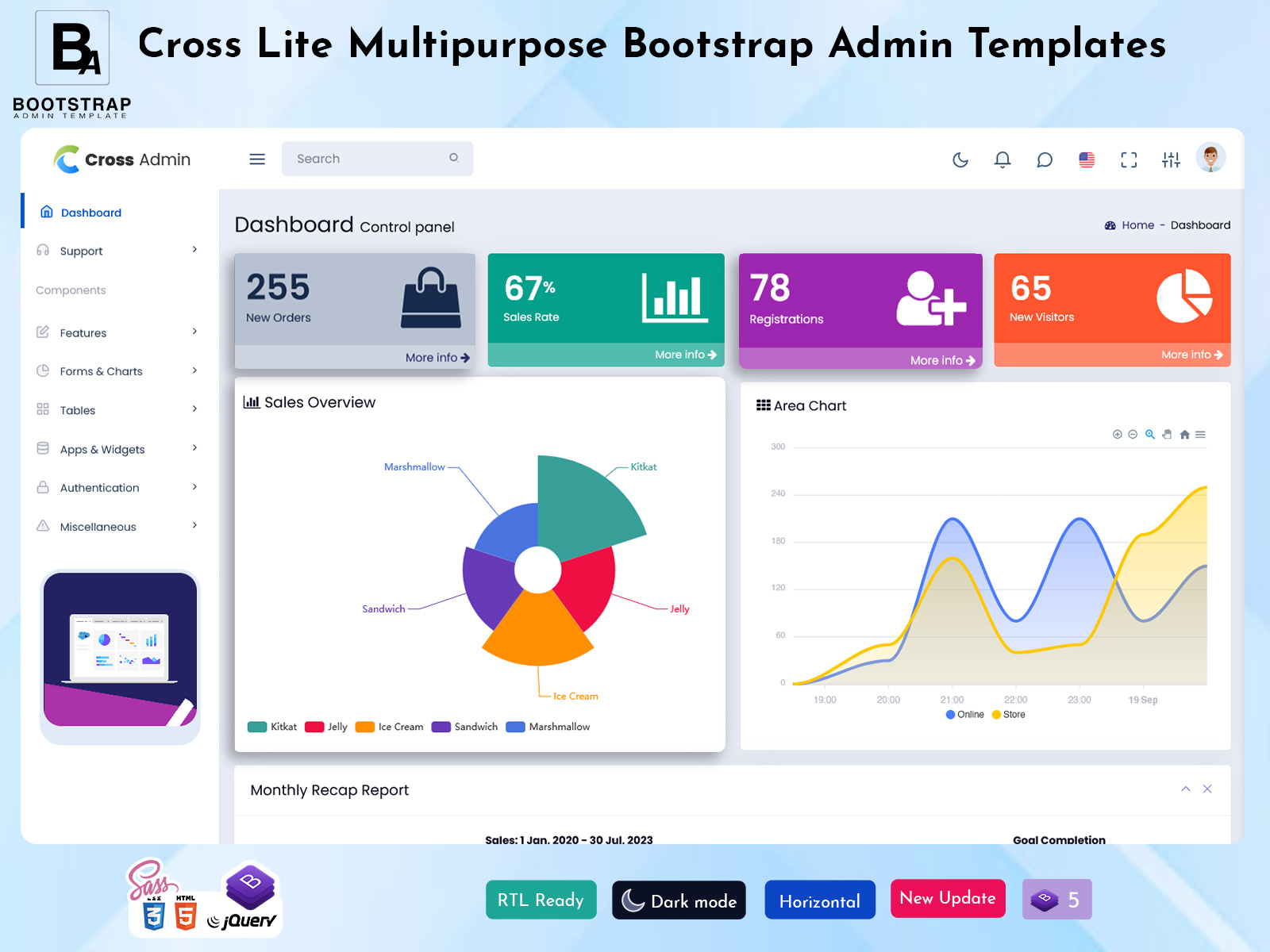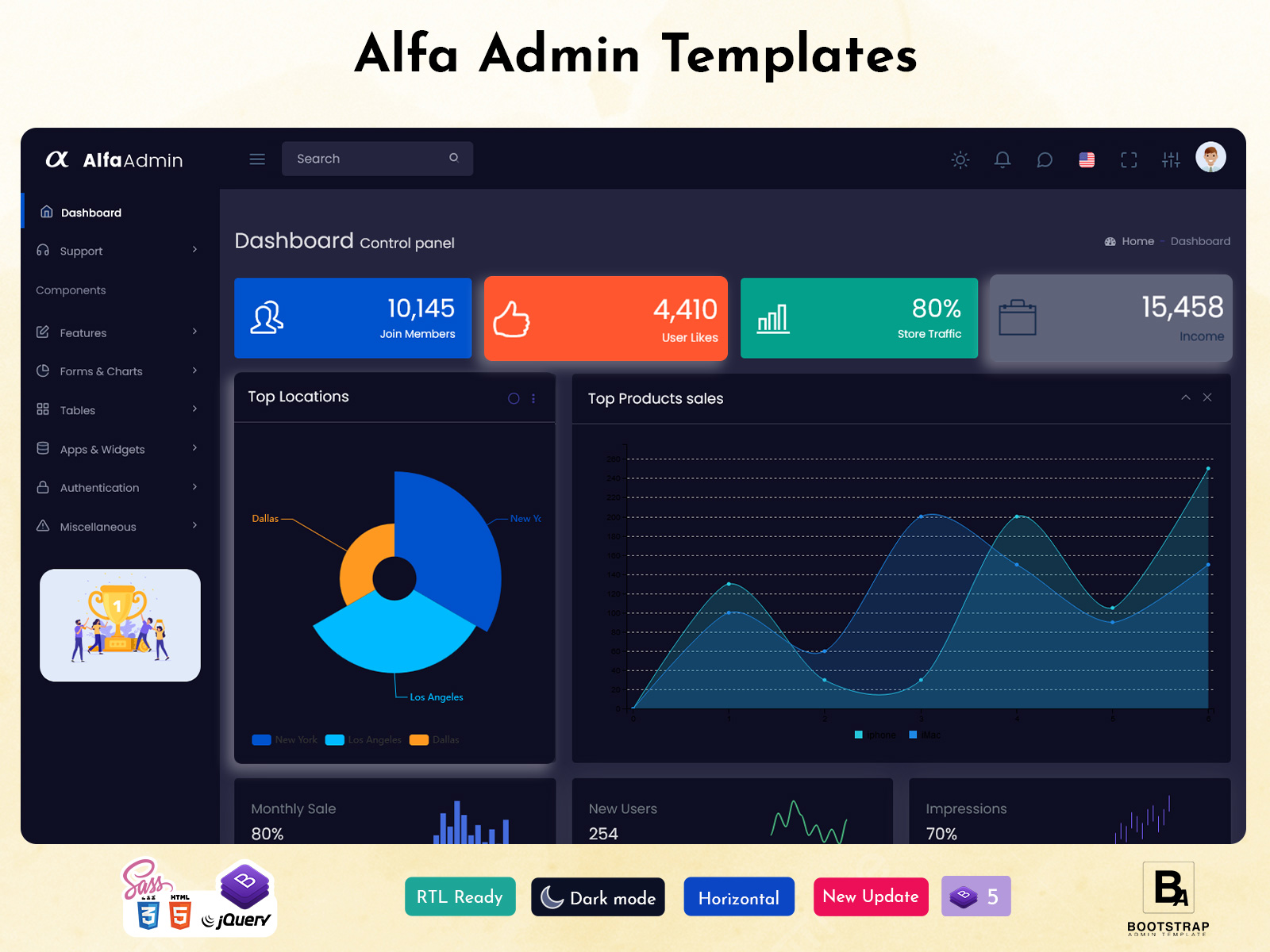
Medical Dashboard – Make Smarter Healthcare Decisions
In today’s fast-paced healthcare environment, hospitals and clinics face increasing pressure to provide high-quality care while efficiently managing resources. Medical professionals, administrators, and healthcare organizations need to make data-driven decisions in real time, ensuring the best outcomes for patients and staff. This is where medical dashboard comes into play.
Dashboard of Medi Admin
Vertical Dashboard
MORE INFO / BUY NOW DEMO
Mini Sidebar Dashboard
MORE INFO / BUY NOW DEMO
Horizontal Dashboard
MORE INFO / BUY NOW DEMO
A medical dashboard is an essential tool that consolidates vast amounts of data into a visual, easy-to-understand format. With the use of graphs, charts, and indicators, hospital and medical professionals can get a quick overview of critical metrics such as patient conditions, treatment progress, hospital occupancy, and operational performance. The hospital admin dashboard specifically helps administrators track and manage the daily operations of the facility, ensuring smooth and efficient management.
Medical dashboards are important because they enable quick access to key information, improving decision-making and response time in various healthcare settings. The integration of hospital dashboard templates ensures that hospitals and medical centers can customize the dashboard according to their specific needs, making data analysis even more straightforward and actionable.
A medical dashboard is an essential tool in emergency situations, where quick decision-making is critical. In an emergency, time is of the essence, and healthcare providers need instant access to accurate, real-time data to make informed decisions. A hospital dashboard provides a comprehensive view of critical metrics such as the number of available beds, the status of emergency room capacity, and the condition of patients. It consolidates patient vital signs, lab results, and other essential information, allowing doctors and nurses to assess and prioritize care more effectively. This immediate access to vital information ensures that emergency teams can act swiftly and allocate resources where they are most needed.
In high-pressure emergency situations, such as during mass casualty events or natural disasters, medical dashboards streamline communication and improve coordination between departments. A hospital admin dashboard can provide real-time updates on staff availability, ensuring that the right personnel are dispatched to the right areas. By visualizing patient flow and resource usage, hospital administrators can efficiently manage the sudden surge in patients, preventing bottlenecks and reducing delays in treatment. This holistic view of the emergency situation helps healthcare professionals respond proactively, ultimately improving patient outcomes and enhancing the efficiency of emergency care.
Benefits of Medical Dashboards
1. Live Data Access
One of the primary benefits of a medical dashboard is its ability to provide real-time data. Instead of sifting through endless reports or waiting for manual updates, healthcare professionals can instantly access live information about various aspects of hospital operations, patient statuses, and clinical outcomes. For example, a hospital dashboard can show the current number of available beds, active patients, and even patient vitals in real-time.
By having access to this immediate data, healthcare teams can make more informed decisions, react swiftly to emerging issues, and improve patient care. For example, if a critical situation arises—like a sudden increase in emergency room admissions—hospital staff can immediately see this data on the dashboard and adjust their resources accordingly.
2. Improved Efficiency and Productivity
A hospital admin dashboard can streamline administrative processes by automatically updating key operational metrics, such as staff schedules, equipment usage, and supply levels. This reduces the time spent manually tracking and updating this information, leading to greater operational efficiency.
For medical staff, having access to real-time data through a hospital dashboard template can help them focus on patient care rather than administrative tasks. With the integration of various departments into one easy-to-use interface, employees can collaborate better and avoid the confusion of working with outdated or incomplete data.
3. Better Decision Making
Medical dashboards give hospital administrators and healthcare providers a centralized view of all the key performance indicators (KPIs) that matter to them. This could include patient wait times, patient outcomes, hospital admissions, staff performance, and much more. By consolidating all this data, decision-makers can identify trends, highlight problems, and make strategic decisions that benefit the hospital and its patients.
For example, a hospital admin dashboard can track hospital occupancy rates and patient admission patterns, helping administrators plan for staffing and resource allocation. Real-time visibility into hospital performance allows them to make data-driven decisions that reduce bottlenecks and improve the patient experience.
4. Improved Patient Care
The ultimate goal of any healthcare system is to deliver high-quality patient care. By using a medical dashboard, healthcare providers can monitor patients’ progress and the treatment they are receiving. Dashboards can highlight important information such as lab results, patient vital signs, and medications in real-time. This allows for quicker responses in case of emergencies, better monitoring of treatment plans, and fewer errors in medication administration.
Moreover, dashboards provide an overview of patient history, helping healthcare providers make well-informed decisions about patient care. For instance, if a doctor has access to real-time data on a patient’s blood pressure, heart rate, and lab results, they can make immediate adjustments to the treatment plan, leading to better patient outcomes.
5. Cost Management and Savings
Healthcare organizations are constantly striving to reduce costs while maintaining high standards of care. Hospital dashboards help in this aspect by providing insight into where resources are being overused or underutilized. Dashboards can track equipment usage, staff attendance, and patient flow, helping administrators identify inefficiencies or areas where the hospital can cut costs without affecting care quality.
A hospital dashboard template can highlight areas of waste or delays, making it easier for hospitals to allocate resources more effectively and improve their bottom line.
6. Customization and Scalability
The beauty of medical dashboards lies in their ability to be tailored to the specific needs of a healthcare organization. Whether you are managing a small clinic or a large hospital, dashboards can be customized with various widgets and modules that display only the most relevant information for your team. Hospital dashboard template make this process even easier by offering ready-made templates that are easy to adapt and deploy.
Furthermore, dashboards can scale as your hospital or healthcare practice grows. New data points and analytics can be added seamlessly to the dashboard, ensuring that it remains useful as your needs evolve over time.
Why We Are Better
When it comes to medical dashboards, not all solutions are created equal. Our approach stands out because we focus on delivering user-friendly and customizable dashboard solutions for hospitals and medical practices of all sizes. Here’s why our service is better:
1. Tailored Solutions:
Our hospital dashboard templates are designed to fit the unique needs of your healthcare facility. Whether you are looking to track patient progress, monitor hospital occupancy, or manage staff schedules, we offer dashboards that can be tailored to your specific requirements.
2. Easy Integration:
Our dashboards integrate seamlessly with your existing systems, so you don’t have to worry about disrupting your daily operations. Whether it’s your electronic health records (EHR) system, patient management software, or billing system, our dashboards pull in data from multiple sources and display it in one easy-to-read interface.
3. Mobile Compatibility:
In today’s world, healthcare professionals need access to data on the go. Our hospital admin dashboard is fully compatible with mobile devices, so healthcare professionals can check critical information anytime, anywhere. Whether in the hospital, at home, or on the move, our mobile-friendly dashboards ensure that you’re always connected.
4. Real-Time Updates:
Our dashboards offer real-time updates, so you can make decisions based on the most current data available. No more waiting for reports or relying on outdated information.
5. User-Friendly Interface:
We understand that healthcare professionals don’t have time to learn complicated software. Our dashboards feature a simple, intuitive interface that makes it easy for anyone—whether a hospital administrator or a nurse—to use and navigate.
6. Scalability and Flexibility:
Whether you are managing a small clinic or a large hospital network, our solutions are scalable and flexible. You can start with a basic dashboard and add additional features as your organization grows.
Who Can Benefit from Medical Dashboards?
A medical dashboard is a valuable tool for a wide range of healthcare professionals, including:
– Hospital Administrators: Hospital administrators play a crucial role in ensuring that all departments within the hospital operate efficiently. They are responsible for overseeing hospital-wide operations, including budgeting, staffing, and resource allocation. A hospital admin dashboard enables administrators to have a real-time overview of all aspects of hospital management.
– Doctors and Nurses: For doctors and nurses, medical dashboards provide a powerful tool to improve patient care. These dashboards offer access to up-to-date patient data, including medical histories, lab results, vital signs, and medication schedules, all in one place. With this real-time data, healthcare professionals can quickly assess a patient’s condition and make more informed decisions about their treatment plans.
– Healthcare IT Staff: Healthcare IT staff are responsible for maintaining the technological infrastructure of a hospital, including electronic health record (EHR) systems, data storage, and network security. Medical dashboards provide IT professionals with a comprehensive view of system performance, helping them monitor server health, system uptime, and user activity. They can spot any glitches, technical issues, or potential security threats before they escalate into significant problems.
– Medical Researchers: For medical researchers, hospital dashboards are essential tools for analyzing large amounts of healthcare data. These dashboards provide easy access to patient records, clinical trial data, research results, and treatment outcomes. Researchers can use the dashboards to identify trends, track patient outcomes, and evaluate the effectiveness of new treatments or medical procedures.
– Patients: Although patients don’t directly interact with medical dashboards, they ultimately benefit from the improvements these dashboards bring to their healthcare. Hospital dashboards improve the overall efficiency and effectiveness of care by giving healthcare providers real-time access to critical data.
How to Get Started with a Medical Dashboard
Getting started with a hospital dashboard solution is simple, and we are here to guide you through the process. Here’s how to get started:
1. Reach Out to Us: Contact our team to discuss your hospital’s specific needs and requirements. We offer free consultations to understand your challenges and goals.
2. Customize Your Dashboard: Based on your feedback, we’ll help you customize a hospital dashboard template that best fits your healthcare facility’s needs.
3. Integration with Existing Systems: Our team will ensure that the dashboard integrates smoothly with your existing systems, whether that’s your EHR, patient management software, or inventory system.
4. Training and Support: We provide training to your staff, ensuring they can use the dashboard effectively. Our support team is always available to assist with any questions or technical issues.
5. Ongoing Improvement: As your hospital evolves, we’ll continue to enhance your dashboard to meet new needs, ensuring that you are always equipped with the best tools.
Conclusion
In today’s fast-paced healthcare environment, the ability to make quick, informed decisions is critical. A medical dashboard is a powerful tool that streamlines the collection and presentation of essential data, making it easier for healthcare professionals to monitor patient progress, optimize hospital operations, and improve overall care. By choosing a customizable and scalable hospital dashboard template, you are investing in a solution that will support your healthcare organization for years to come.
Don’t wait—contact us today to get started with a hospital admin dashboard and experience the benefits of real-time data access, better decision-making, and improved patient care.
Buy Now and Get Started Today!
Click below to purchase and start unlocking the full potential of your business!






